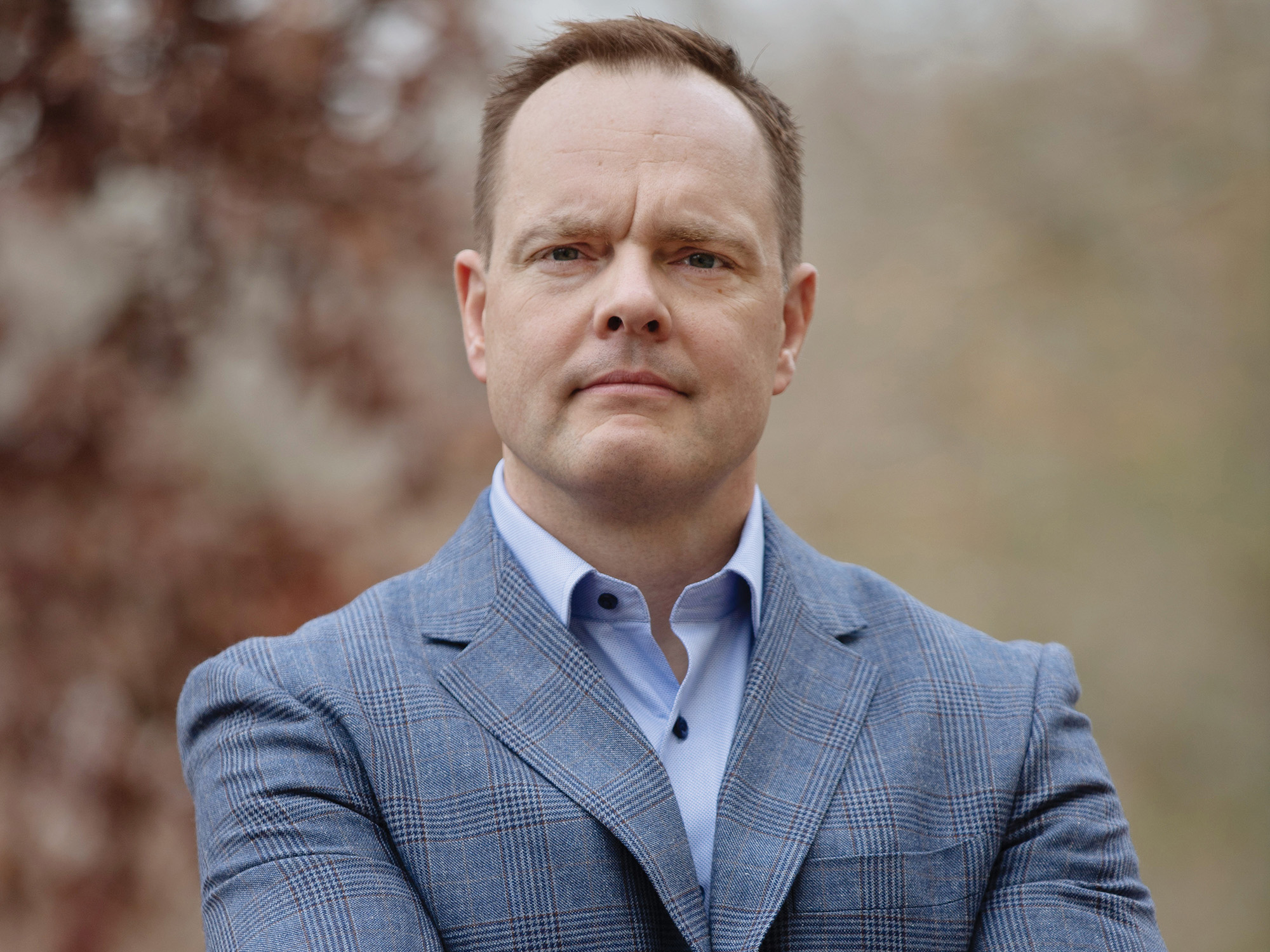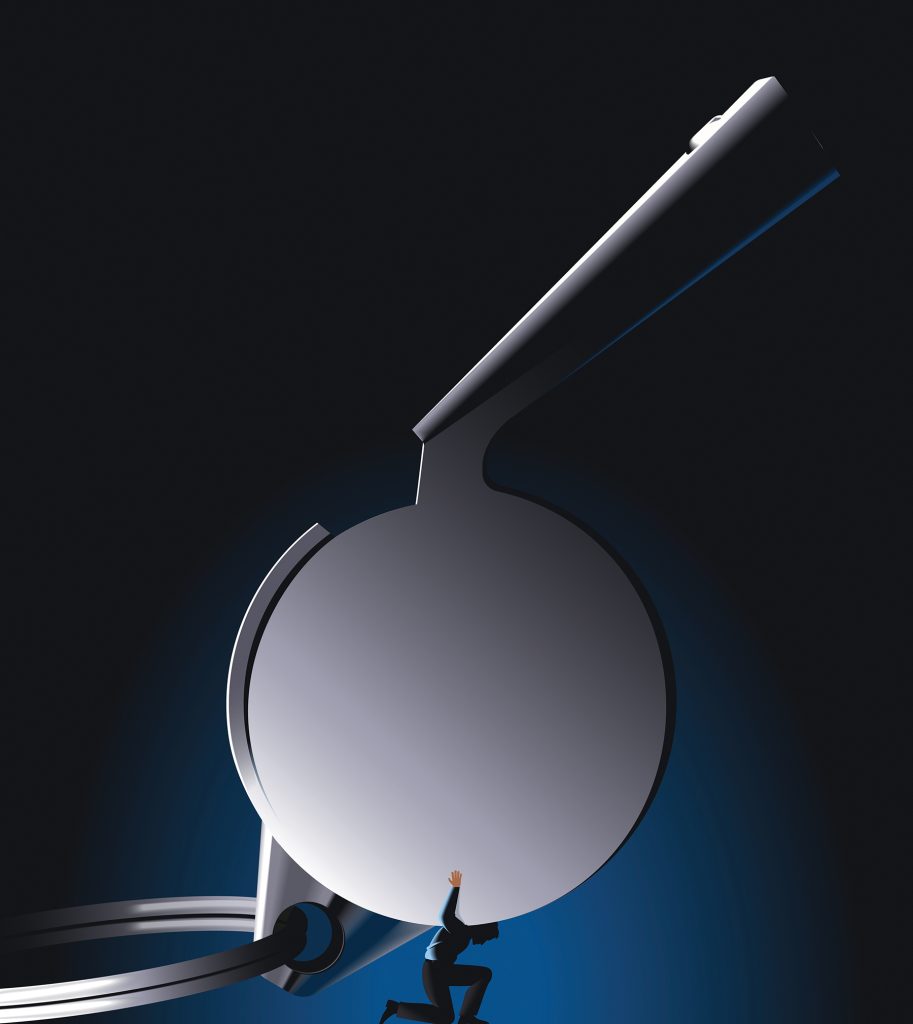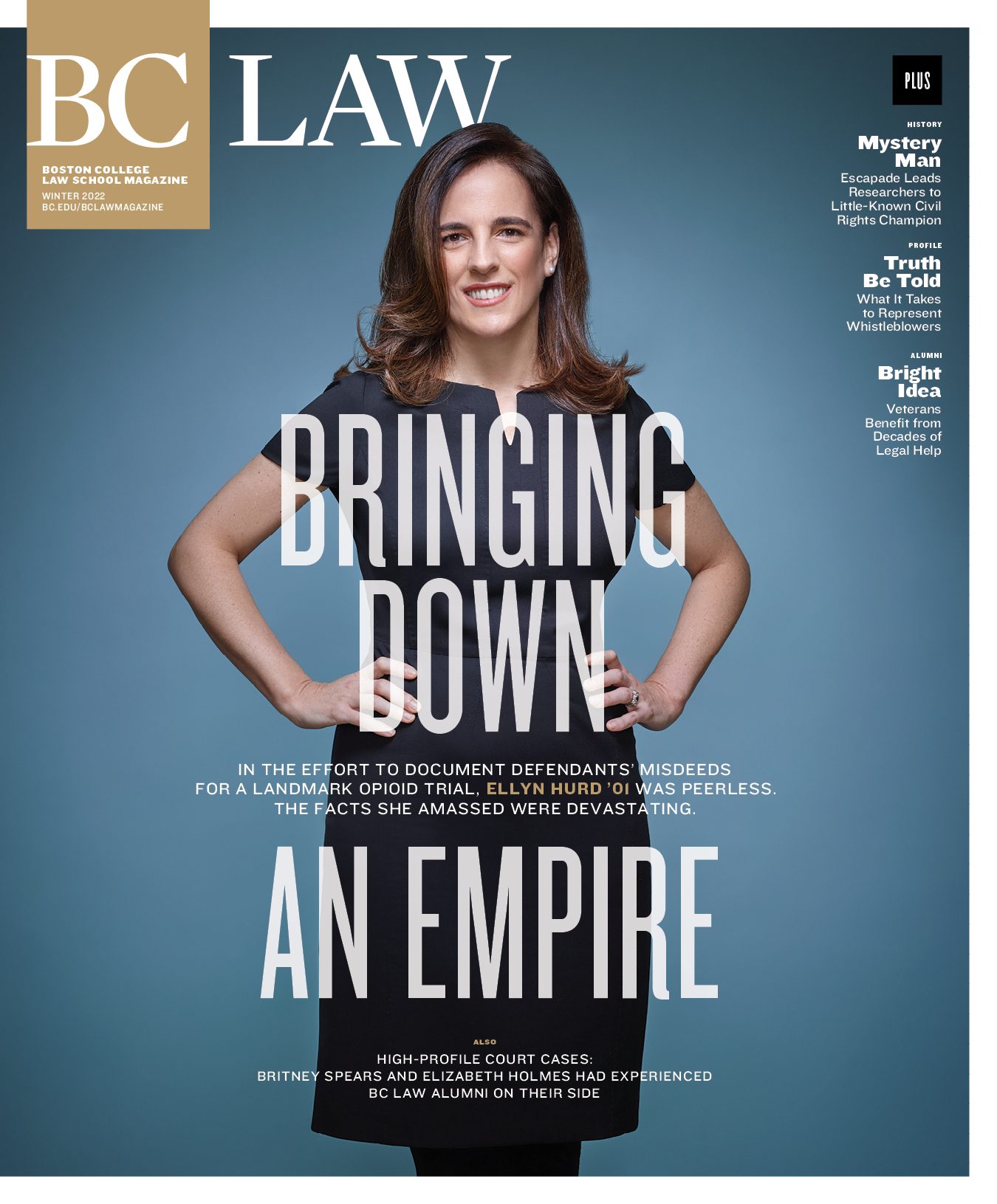ORDINARY PEOPLE-TURNED WHISTLEBLOWERS and their attorneys stand on the frontline protecting America from fraud and financial crime.
That’s never been truer than it is today, as corporate complexity, advances in technology, and the globalization of the financial services industry make wrongdoing increasingly tempting and achievable. Sometimes, whistleblowing threatens the livelihoods of criminals who are powerful enough to destroy governments. Whistleblowers often pay dearly for their deeds. Whistleblowing demands nerves-of-steel teamwork between client and attorney.
Case in point: Phil Brewster ’03 who, with his co-counsel Patrick Mincey, is representing a whistleblower in a matter that is connected to a sprawling, years-long federal investigation of several well-known financial management giants, and an alleged international money laundering scheme of billions of dollars in oil money extracted from the Venezuelan government. “We know there’s been a tremendous fraud committed on the Venezuelan people, and its tentacles spread everywhere,” Brewster says. “We’re in the thick of it, and we’re not stopping.”
But what, exactly, does that entail? In a world where corruption is a threat to democracy and civil society, this is an important question. What does it take to be, and to legally represent, whistleblowers?

For Brewster, who founded Brewster Law Firm more than a decade ago in the Chicago area, where he handles False Claims Act matters, SEC whistleblower referrals, and complex healthcare and federal regulatory investigations, the significance of the Venezuela case isn’t only in the alleged lawbreaking. It’s in what the alleged lawbreaking implies. “We are stopping the alleged facilitation by US securities firms of the looting of the Venezuelan treasury and the harming of the Venezuelan people,” he says.
The story of Venezuela is heartbreaking. Up until the late 1980s, it was a thriving democracy, but since then, it has spiraled into disaster, thanks to a toxic mix of monetary woes, growing inequality, over-reliance on oil exports, and corruption. The country is plagued by high rates of violent crime, human rights abuses, and shortages of gasoline, electricity, food, water, and medicine. More than 5 million Venezuelans have fled the country. More than 90 percent of Venezuelans are living in poverty, and, between that and rampant inflation, the country is on the brink of famine.
“In 2020, I saw this tremendous movement for social justice in America, and I’m sitting in my office and thinking, well, what about that,” says Brewster, referring to Venezuela. Brewster, who has represented whistleblowers in two money laundering referrals, two healthcare cases, and two government procurement cases, adds, “If everybody is in abject poverty, it doesn’t work. You can’t get to higher order social justice and civil rights if everyone is eating out of a dumpster, which is basically what is going on in Venezuela right now.”
A whistleblower’s lawyer must be dogged and keep mum about the case for years on end without the guarantee of any reward. “The odds of prevailing are low, and you’re just in this environment where you have to keep your head down and work hard.”
Phil Brewster ’03
WHISTLEBLOWING IN AMERICA is a time-honored way to catch high-stakes wrongdoing. In 1777, naval officers Samuel Shaw and Richard Marven reported their commanding officer to Navy brass after witnessing him torture British prisoners of war. In 1863, as unscrupulous government contractors pocketed taxpayer money while delivering spoiled food, fake gunpowder, and cardboard boots to Union soldiers, President Abraham Lincoln signed into law the False Claims Act, incentivizing employees to blow the whistle on their corrupt employers. Later famous whistleblower cases include Daniel Ellsberg’s leak of the Pentagon Papers (1971), Karen Silkwood’s revelations on negligence at an Oklahoma plutonium plant (1974), Sherron Watkins’s memo revealing accounting fraud at Enron (2001), Tyler Shultz’s claims of doctored research at Elizabeth Holmes’s Theranos start-up (2014), and Frances Haugen’s documenting of Facebook’s reckless disregard for safety (2021).
One reason why whistleblowing matters is that, when ill-gotten gains are money-laundered because they can’t be legitimately invested, the suffering can be extraordinary. With an estimated 2 to 5 percent of global GDP, or $800 billion to $2 trillion, lost to money laundering each year, that’s a lot of potential damage. And it’s not just money laundering. Billions of dollars, for example, are estimated to be lost to fraud and false claims in the US healthcare sector each year. “That money is not going to where it’s supposed to go, which is taking care of people,” Peter Budetti, a former deputy administrator at the Centers for Medicare and Medicaid Services, told the New Yorker in 2019. “They are stealing from people who would otherwise be immunizing kids or delivering babies. That’s the heart of it.”
It is perhaps no wonder, then, that whistleblower programs have been proliferating. The federal False Claims Act, modernized since Civil War days, allows not only the Justice Department, but also private individuals, to sue those who have defrauded the government. Other programs, like those administered by the SEC, IRS, the Commodity Futures Trading Commission, and the National Highway Traffic Safety Administration, run on tips: whistleblowers themselves cannot sue wrongdoers, but they can report wrongdoing to these agencies. The agencies then decide whether to investigate and prosecute. Several dozen false claims acts also exist at the state level. To encourage people to step forward, whistleblower programs come with anti-retaliation protections, and with incentives that promise the whistleblower a percentage of any monetary award in a successful case.

BC Law Associate Professor Brian Quinn sees the government’s reliance on whistleblowers for enforcement as consistent with our overall corporate oversight regime. “To a certain extent, the entire corporate governance system is privately based because shareholders are typically the ones with the most at stake, and they’re the ones who have standing to bring lawsuits—and do bring lawsuits—against directors who may go too far,” he says.
Because its resources are limited, the government won’t open an investigation just on the say-so of a simple tip that something seems off. That’s one reason why whistleblowers need lawyers: they need to make a case. They must persuade the government to investigate by amassing, on their own, enough evidence to be compelling. They must connect the dots. As they dig up financial records, emails, texts, spreadsheets, invoices, algorithms, and whatever else is necessary to document fraud, whistleblowers essentially become informants against their employers, and they may continue in that role even if the government steps in.
The personal toll of that can be enormous, and is not necessarily alleviated by anti-retaliation laws. As Jeb White, president and CEO of the public interest nonprofits Taxpayers Against Fraud and the TAF Education Fund, puts it, “Even the largest payout for an anti-retaliation case is going to be a rounding error on the business ledgers of very large companies.” And so, whistleblowers face hostile work environments and attacks that can damage their reputations. They lose their jobs. They lose their livelihoods. Over time, they can become increasingly isolated because their lives can be consumed by their case but they can’t talk about it with anyone but their attorney. The stress can lead to divorce, illness, even suicide. The risks are high while the likelihood of prevailing is low. Some of these risks are shared with their attorneys, who will work on contingency for years and possibly never see a dime for their efforts.
GIVEN THESE REALITIES, it’s clear that it takes a special kind of lawyer to effectively and humanely represent a whistleblower. Those who know Phil Brewster say he possesses just the right qualities for this work.
Among those qualities are persistence and creativity. Brewster once represented Dave Pearah’s company when Pearah was the CEO of a software firm that was a corporate relator (another word for whistleblower) in a False Claims Act matter. Pearah, who is now CEO of the software security firm SpiderOak, says, “Once Phil has selected a topic or cause or injustice that he wants to address, he is a freaking pit bull in going after it.” Plus, Pearah says, “He is not intimidated by the size of the opponent, and it’s because he’s thinking creatively about how to create leverage and interest to the betterment of the client.”
Expertise and sophistication are also key. Patrick Mincey specifically sought out Brewster as his co-counsel in the Venezuela case. “When it became clear that we were going to be making an approach to the government through the SEC Office of the Whistleblower, I felt we needed to bring on someone with some real expertise and real experience, and, of course, the right temperament and sophistication. That was Phil,” says Mincey, who is chair of the White Collar, Government Investigations & Special Matters Group at the North Carolina law firm Cranfill Sumner. “My personal tendency is often to act on information quickly and decisively. Phil’s approach, which I think is extraordinarily valuable, is much more measured and much more collected,” he says. “Having the maturity and awareness and mindset to take any morsel of information and figure where it fits in this broader mosaic is a talent. It’s not something that is taught. It is developed.”
Whistleblowers face hostile work environments and attacks that can damage their reputations. They lose their jobs. They lose their livelihoods. Over time, they can become increasingly isolated because their lives can be consumed by their case but they can’t talk about it with anyone but their attorney.
Stewarding clients through the process is central to a whistleblower legal practice. Whistleblowing, Mincey says, involves “preparing materials, submitting those materials, poring through them with government investigators for many years; it means that the lawyer’s role is that much more involved, and keeping a client in the right state of mind is something that takes a special ability that is beyond the scope of legal training, legal expertise, practitioner training. It takes the right personality.”
Whistleblowers’ lives can get so bleak that they may fall victim to self-doubt, regret, even self-loathing. “Not a lot of lawyers understand what the client is going through,” Brewster himself says. “I generally meet people on their worst day, at rock bottom.” They’ve usually seen five or six other lawyers before they contact him. Brewster takes that as a good sign: “When I hear that,” he says, “I know that I am talking to the right person. It means that they believe deeply in their case.”
Whistleblower cases are lengthy and complex, and the whistleblower must be prepared to treat it like a second job. Brewster is selective about whom he chooses to represent. He has met with numerous whistleblowers over the years and done extensive case assessments. He looks for someone who will be hardworking, focused, committed, thorough, and intelligent. “You’re going to invest six months investigating something before you even file it,” he says. “I spend a lot of time looking at what the case is, getting to know the person, and really deciding if the case is worth investing in.” A whistleblower’s lawyer must be dogged and keep mum about the case for years on end without the guarantee of any reward. “The odds of prevailing are low, and you’re just in this environment where you have to keep your head down and work hard,” Brewster says.
Whistleblowers are often the only window into corruption that the government has. “The benefit of the whistleblower is that it allows the government to efficiently and effectively investigate and prosecute fraud that otherwise would go undetected,” says Jeb White of Taxpayers Against Fraud. And, in many ways, the system works.
Since its inception in 2010, the SEC whistleblower program has won $5 billion in monetary sanctions, with $1.1 billion awarded to 214 individuals who blew the whistle. In fiscal year 2019, the Justice Department scored $3 billion in judgments and settlements under the False Claims Act; $2.1 billion of that came through cases originating with whistleblowers, who collectively received rewards of $265 million. And yet it is also highly likely that lots of fraud is going undetected. “Despite what we hear, the government does have limited resources. They don’t have the ability to go after fraud at the level that we’d want them to,” says White. “Trillions of dollars have flown out of Congress in the last eighteen months, and not a single dollar was added to the Department of Justice to actually monitor for fraud.”




